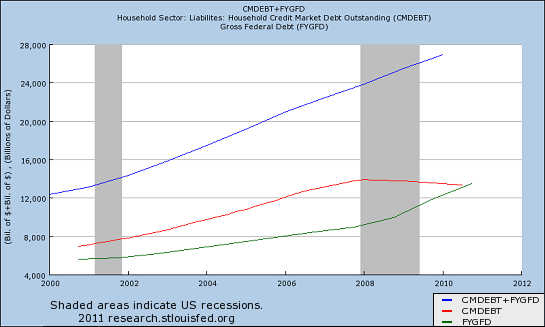The Death of Demand: The Post-Consumer Debt Economy
Keynesians claim more debt will goose "demand;" they're wrong. Boosting debt has distorted the economy for 40 years, and the end-game is finally approaching. Keynesians are constantly demanding more debt be taken on to spark "demand" for more stuff. What if debt-fueled demand is dead, expired of natural causes? If so, then the Keynesians are pushing on a string. The truth is the U.S. has long been a post-consumer economy. Everybody already had a TV, phone, car, etc. 40 years ago, which is coincidentally when wages began their 40-year stagnation and the nation's public and private debts began exploding higher as the forces of financialization took over. In other words, the only way to get people to buy more crap was to give them vast quantities of debt. Now that debts exceed 350% of the nation's GDP, we've reached the end of the financialization process: we can't afford any more debt unless the interest rate is near-zero. Hey, isn't that the Federal Reserve's policy now, forever and ever, near-zero interest rates? No wonder. If the nation had to pay a historically average rate of interest on its debts, the economy would quickly implode like a supernova star. Take a look at this chart, courtesy of the excellent Market Ticker. It shows how much GDP has been created by each additional unit of debt. In other words, if we add $1 of debt, how much did that goose the GDP? If you follow the zero line, you will find that $1 of debt rarely boosts the GDP more than $1. I added the red lines to show the generational shift that occurred in the mid-1970s: debt no longer boosted GDP by much, so more debt had to be taken on to keep goosing the GDP. This meant that more of the nation's income was diverted to servicing the rising debt, which also meant that wages stagnated and profits to the financial sector skyrocketed. As those profits grew to dominate the profits of Corporate America (roughly, the S&P 500), then the political power of the financial sector and wall Street rose proportionately. Big picture, this reliance on debt for "growth" has led to the banks owning the government and the economy. This is the Dark Side of Keynesism. The "borrow more, we need more demand!" thumpings of "liberal" economists like Krugman and Reich are completely blind to the fact that the borrowing they demand is precisely what has sold the nation down the river and handed control to the banks and Wall Street. These structural changes are why the naive bleatings of these same Keynesians to "control the banks" are failing: by making the economy totally dependent on ever more borrowing and debt, the Keynesians created the financialization monster. Now that it controls the economy, they're whining, please Mister Too Big to Fail Bank, please hand back control to us nice economists. It doesn't work that way. Having sold your soul to the debt monster, the monster now controls you. Here is a chart of the Keynesian model of financial pathology. As private debt has flattened out--people simply can't borrow any more, as their incomes are flat and they're already maxed out on debt--the Federal government a.k.a. Savior State has ramped up its borrowing to replace private debt. Meanwhile, total debt continues to zoom ever higher. The Federal Reserve is playing a game of Pretend: Let's pretend that if interest rates are near-zero, we'll always be able to borrow more. Hey, what's a trillion dollars at zero interest? You and I could make the interest-only payments each month, because they're zero. But shoving "free money" into banks and Wall Street doesn't filter down to John Q. Citizen: it simply incentivizes massive speculation in stocks, commodities, seaside resorts, empty cities in China, you name it. This is the basis of the current stock, bond and commodities booms in the global economy: push trillions of dollars in "free money" to financial players, and guess what, that hot money flows out seeking a fat return. The Keynesians and other economists have no ideas for confronting the reality of a post-consumerist debt economy and society. Like frenzied rats in a cage, they only have one lever to push to release the cocaine-laced pellets, and so they've been pushing it for 40 years. Now they're hitting the bar with frantic energy, hoping the crazed and addled rats around them can dredge up some "demand" for more pellets to "consume." But the consumer-rats are bloated and lethargic; they've consumed so much debt-drug that they're near death. Like a star which has expanded and now cannot maintain its grand state, the debt-based consumerist economy is now poised to experience a supernova implosion. Of Two Minds Kindle edition: Of Two Minds blog-Kindle

Readers forum: DailyJava.net.
Order Survival+: Structuring Prosperity for Yourself and the Nation (free bits) (Mobi ebook) (Kindle) or Survival+ The Primer (Kindle) or Weblogs & New Media: Marketing in Crisis (free bits) (Kindle) or from your local bookseller.Thank you, Harvey D. ($100), for your astoundingly generous contribution to this site -- I am greatly honored by your ongoing support and readership. Thank you, Mark L. ($10), for your much-appreciated generous contribution to this site-- I am greatly honored by your steadfast support and readership.























